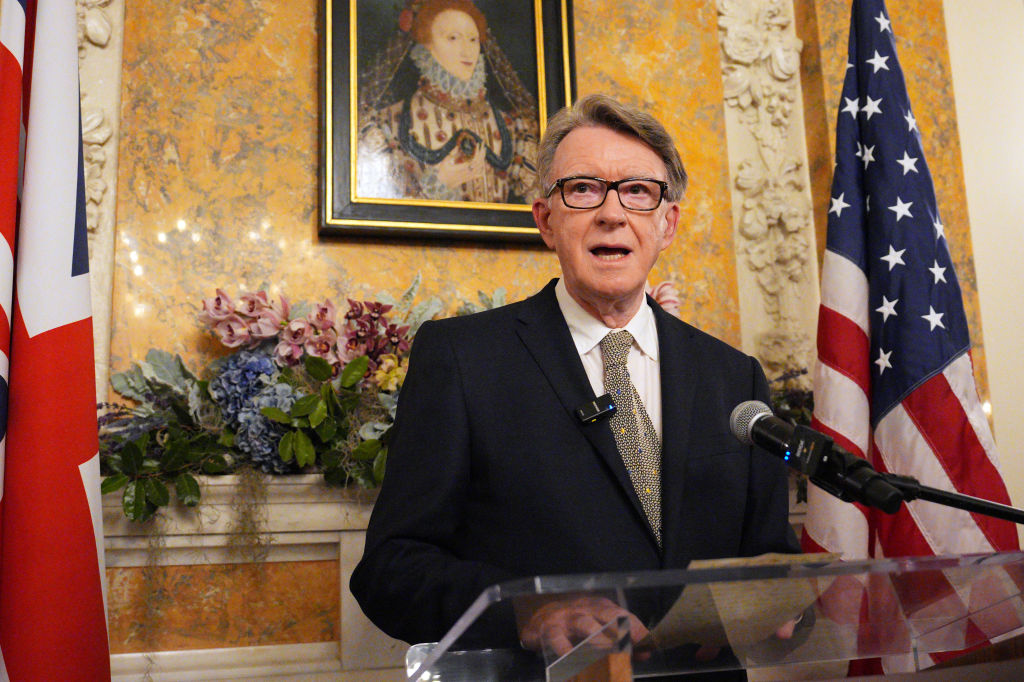Well, that didn’t take long, did it? Less than a month after presenting his credentials to President Trump, His Britannic Majesty’s Ambassador in Washington was being accused by an MP in the House of Commons of ‘freelancing on US TV’. The UK armed forces minister, Luke Pollard, had earlier distanced himself from comments made by Lord Mandelson, saying ‘that’s not government policy’.
Both were referring to a typically mellifluous performance by Mandelson on ABC’s popular Sunday politics talk-show, This Week. The presenter was another master of fluent politics-speak, George Stephanopoulos, one-time spokesman for the Clinton White House turned media pundit, and the conversation flowed with amicable ease.
So where had our newly minted ambassador gone wrong? Let’s get one thing clear. He hadn’t been bamboozled into saying something he did not mean. Stephanopoulos hadn’t set any traps. Mandelson said nothing that he could later claim had been ‘taken out of context’. He was asked (how could he not be?) about the disastrous bust-up between Trump and Zelensky in the Oval Office and had simply expressed, quite clearly, his view that Ukraine’s president should mend fences with Trump, sign up to his peace plan and call Russia’s bluff by being first to commit to a ceasefire.
His exact words show that he was not exactly beating about the bush. What was needed, he said, was a ‘very radical reset’ that would involve ‘the United States and Ukraine getting back on the same page’ with ‘President Zelensky giving his unequivocal backing to the initiative that President Trump is taking to end the war and to bring a just and lasting peace to Ukraine.’ He went on to advise the Europeans that ‘they need to back the calls for a ceasefire’ too.
The timing to put it mildly, was not good. What those watching on the US side of the Atlantic may not have appreciated was that, while Mandelson was advising Ukraine’s president essentially to eat humble pie and prepare for peace in his country on US terms, the self-same Zelensky was being feted by a succession of European leaders at Lancaster House, having been demonstratively smothered by hugs and kisses by the UK Prime Minister at Downing Street. The ultimate show of support awaited in the shape of a helicopter trip to Sandringham for a photo-op with the King.
There was also a gap between the course of action being charted in London and that being recommended by our man in DC. Europe, with ‘Britain leading from the front’, as Starmer said several times in the Commons on Monday, was standing full square behind Ukraine. There could be no question of a ceasefire. The Europeans were going to carry on supplying Ukraine with weapons to place it ‘in the strongest possible position to fight on if necessary’.
The UK and France were even preparing to put boots on the ground in a ‘coalition of the willing’, should peace somehow break out. Nothing there about Zelensky making nice with Washington, or taking up the US peace plan, or a ceasefire.
Worse still, as Mandelson’s words crossed the United States following the time zones, they would still have been playing in California just as Sir Keir Starmer was approaching his finest hour: an impressive press conference in the gilded hall of Lancaster House, where he set out a four-point plan, gravely presenting himself as the new-found leader of Europe.
With no government worth speaking of in Germany, ditto in France, fervent but lightweight officials speaking for the EU, and the only real heavyweight, Nato’s Mark Rutte, keeping a low profile, Sir Keir seemed to be in his lawyerly element, and he repeated the performance in the House of Commons the next day. The fatal flaw, that any peace plan needs at least some sort of Russian buy-in, and that the only person so far willing to talk to the Russians is President Trump, generally passed unobserved on the European side of the Atlantic.
Which takes us back to the splendid Lutyens mansion on Massachusetts Avenue, where the UK ambassador in Washington resides – next door, incidentally, to the Vice President. When Mandelson’s name first appeared in the frame to become the UK’s ambassador to the court of Donald Trump, I was unconvinced. Not because I oppose political appointments to diplomatic posts on principle; I can see their use, and his trade credentials certainly looked like a plus. Nor particularly because I questioned his diplomatic skills. It was mainly because I had reported on his visits to the US as Northern Ireland Secretary, and questioned how well he spoke ‘American’. His predecessor, Mo Mowlam, had been a natural. Mandelson, to put it mildly, was not, and he had a hard time getting his message across.
In that judgement, I admit I was wrong. This weekend, Mandelson conveyed his message to great effect. The trouble was, it appeared to be his message, not his government’s.






Comments